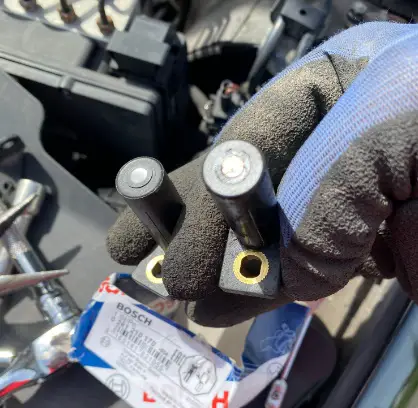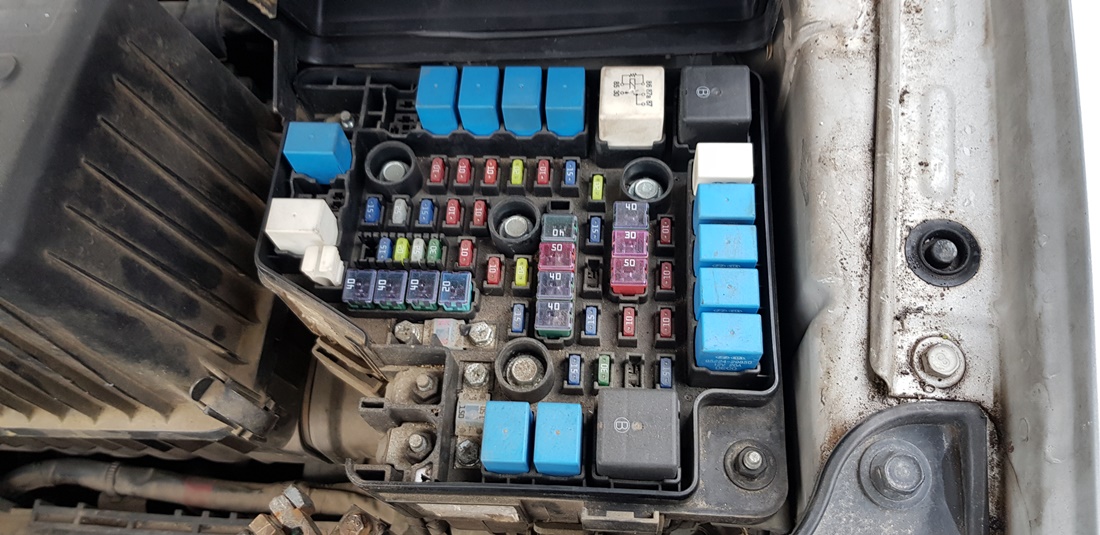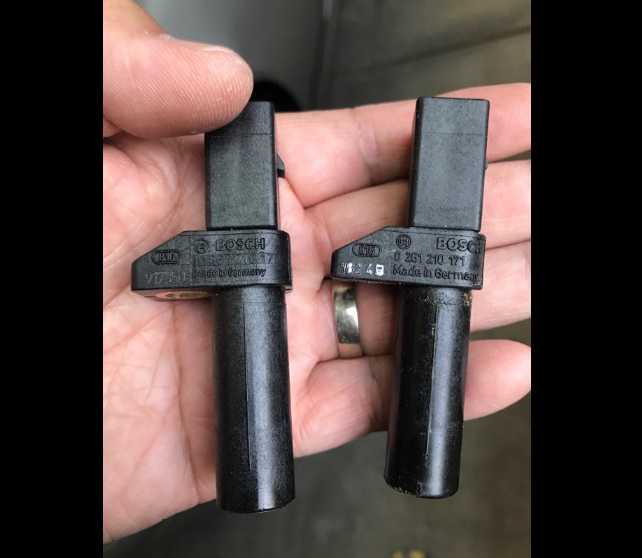The wheel bearing is a part that connects the wheels to the axle. The wheel bearing allows the wheel to spin with minimum friction. It is a crucial part of the wheel assembly.
So the question is: Is it safe to drive with a bad wheel bearing?
Key Takeaway
- Driving with a bad wheel bearing is unsafe due to potential instability at high speeds, reduced vehicle control, and the risk of the tire separating from the hub assembly, potentially causing accidents or serious damage; thus, it’s crucial to address wheel bearing issues promptly for road safety.
- If your wheel bearing has been making those noises for a long period of time, it is not safe to drive your vehicle any longer because the wheel bearing could get loose or get completely separated from the knuckle at any time.
What is a Wheel Bearing?
A wheel bearing is a critical component in a car’s wheel assembly that enables the wheel to spin freely with minimal friction. Situated within the wheel hub, it connects the wheel to the axle.
The bearing itself typically consists of a set of steel balls or tapered rollers held together by a metal ring, known as a race.
Wheel bearings play a crucial role in the overall performance and safety of a vehicle. They bear the vehicle’s weight and withstand both radial and axial loads, which are forces exerted from driving and turning the vehicle.
Is It Safe To Drive With a Bad Wheel Bearing

No, it is not safe to drive with a bad wheel bearing because the vehicle becomes unsafe and unstable at higher speeds.
Wheel bearings are a vital part of your car’s suspension system, and they provide support for your vehicle while in motion.
Without properly functioning wheel bearings, your car will be unsafe and unstable when driving at higher speeds.
This can lead to reduced control over the vehicle and cause an accident or other serious damage.
Additionally, wheel bearing failure could lead to the tire separating from the hub assembly which can cause catastrophic effects while driving on the highway.
It is best to address any issues with wheel bearings as soon as possible in order to ensure your safety while on the road.
What Causes Failure in Wheel Bearing
- Driving through deep water or mud
- Poor road conditions
- Unbalanced tires
- Overweight loads
- Poor installation or faulty adjustment
- Inadequate lubrication
- Impact damage
- Seal failure
How Long Will a Wheel Bearing Last After It Starts Making a Noise
Once a wheel bearing starts making noise, it is typically expected to last approximately 1,000 to 1,500 miles.
However, it’s important not to ignore the issue, as driving with a bad wheel bearing can lead to more serious car problems or even a potential accident.
What Happens If You Drive on Bad Wheel Bearings?
Driving on bad wheel bearings is dangerous as it can lead to poor vehicle control, increased tire wear, noise and vibration, possible wheel detachment while driving, and further damage to the car, potentially resulting in costly repairs.
Driving on bad wheel bearings can lead to a variety of dangerous situations.
First and foremost, a failing wheel bearing can cause poor vehicle handling and increased tire wear, making the vehicle unstable and difficult to control.
It can also cause noise and vibration that increases with the vehicle’s speed. In severe cases, a faulty wheel bearing can even cause the wheel to come off while driving, leading to a potentially catastrophic accident.
Furthermore, continued driving on a bad wheel bearing can lead to extensive damage to other parts of the car, resulting in more costly repairs down the line.
How Fast Can You Drive on a Bad Wheel Bearing
It is suggested that you drive slowly and steadily at around 40mph or less if your car has a bad wheel bearing.
However, this is not a long-term solution. A bad wheel bearing can lead to increased friction, poor vehicle handling, and in severe cases, the wheel can even come off while driving.
What Does Bad Wheel Bearing Noise Sound Like?
Bad wheel bearing noise is often described as a grinding, growling, chirping, or humming sound.
This noise may become louder or more pronounced when you’re driving at high speeds or when turning the vehicle.
It can sometimes sound like you’re driving over a rumble strip on the shoulder of a highway, even when you’re on a smooth road.
In some cases, bad wheel bearing noise could even manifest as a clunk or squeak. The sound intensifies with the speed of the vehicle and is typically cyclic in nature.
What Happens When a Wheel Bearing Goes Out While Driving
- Unusual Noises: One of the first signs of a failing wheel bearing is unusual noise, such as grinding, roaring, or chirping from the affected wheel.
- Poor Vehicle Handling: A faulty wheel bearing can cause poor vehicle handling, making the vehicle pull to one side, especially during braking. This can make the vehicle hard to control.
- Increased Friction and Heat: The damaged wheel bearing can generate excessive friction and heat. In severe cases, this can cause the axle, hub, or spindle to weld itself, causing the wheel to lock up and potentially leading to a loss of control of the vehicle.
- Wheel Detachment: In extreme cases, a completely failed wheel bearing can cause the wheel to come off the vehicle while driving, which could lead to a catastrophic accident.
- Damage to Other Components: Driving with a bad wheel bearing can also damage other parts of the vehicle, such as the axle and the hub, leading to more extensive and costly repairs.
Symptoms of a Bad Wheel Bearing

Symptoms of a Bad Wheel Bearing
- Unusual noises (grinding, humming, or roaring)
- Poor vehicle handling
- Vehicle pulling to one side
- Uneven tire wear
- Excessive play in the wheel
- Vibrations in the steering wheel
- The ABS light is on
- Decreased fuel efficiency.
Wheel Bearing Replacement Cost
- Kelly Blue Book estimates the national average is about $350 to fix the wheel bearings at one wheel.
- Car Talk suggests the overall average cost is between $300 and $500.
- RepairPal’s estimate for a Wheel Bearing Replacement is between $278 and $359.
- CarParts.com indicates that you can expect to pay anywhere between $100 and $300 on parts alone.
- Fixd App states that the average cost for wheel bearing replacement is $107 to $347.
- Oards.com mentions that if you were to replace all the wheel bearings of your vehicle, you should expect to pay anywhere between $800 and $1,000 in total.
- Towingless.com suggests that replacing only one wheel bearing can cost approximately $130 to $220.
How Long Do Wheel Bearings Last?
The lifespan of wheel bearings is between 85,000 and 100,000 miles. However, some wheel bearings can last for the lifetime of the vehicle, while others might need replacement within 75,000 miles.
Factors such as driving conditions, driving habits, and the quality of the bearing itself can all impact its lifespan.
FAQs
Q: How long can you drive with a bad wheel bearing?
A: It is not recommended to drive with a bad wheel bearing for an extended period of time. In some cases, you may be able to drive short distances at low speeds, but it is best to have the bearing replaced as soon as possible to avoid further damage.
Q: What are the signs of a bad wheel bearing?
A: Some common signs of a bad wheel bearing include noise coming from the wheel, such as a grinding or humming noise, excessive play or vibration in the wheel, and steering wheel instability. If you notice any of these signs, it is important to have the wheel bearing inspected and replaced if necessary.
Q: Can a bad wheel bearing make noise?
A: Yes, a bad wheel bearing can make noise. The most common noise associated with a bad wheel bearing is a grinding or humming noise coming from the wheel. This noise is typically louder when the vehicle is in motion and may change in pitch or intensity depending on the speed of the vehicle.
Q: How can I replace a wheel bearing?
A: Wheel bearings are typically replaced by a professional mechanic. The process involves removing the wheel, brake caliper, and rotor, as well as disconnecting the axle from the wheel hub. The old bearing is then removed and a new one is pressed into place. It is important to follow the manufacturer’s instructions and use the correct tools and procedures when replacing a wheel bearing.
Q: Can a bad wheel bearing cause the wheel to become worn?
A: Yes, a bad wheel bearing can cause the wheel to become worn. When a wheel bearing is faulty, it can affect the alignment and balance of the wheel, leading to uneven wear and tear on the tire. This can result in a decrease in the overall performance and safety of the vehicle.
Q: How can I tell if my front wheel bearing is bad?
A: There are several signs that may indicate a bad front wheel bearing. These include noise coming from the front wheel, such as a grinding or humming noise, vibrations or play in the wheel, and steering wheel instability. If you suspect a bad front wheel bearing, it is important to have it inspected and replaced if necessary.
Q: How can I tell if my rear wheel bearing is bad?
A: Similar to a front wheel bearing, signs of a bad rear wheel bearing may include noise coming from the wheel, vibrations or play in the wheel, and steering wheel instability. However, it is important to note that the symptoms may be less noticeable in the rear. It is best to have a professional mechanic inspect the rear wheel bearing if you suspect it may be faulty.
Q: How do I know if my wheel bearing is bad?
A: If your wheel bearing is bad, you may experience various symptoms such as noise coming from the wheel, vibrations or play in the wheel, steering wheel instability, or uneven tire wear. If you notice any of these signs, it is important to have the wheel bearing inspected and replaced if necessary.
Q: What can cause a wheel bearing to go bad?
A: There are several factors that can cause a wheel bearing to go bad. These include excessive wear and tear, lack of lubrication, contamination from dirt or debris, and damage from an accident or impact. Regular maintenance and inspections can help prevent premature wheel bearing failure.
Q: How does a bad wheel bearing sound?
A: A bad wheel bearing can produce various sounds, but the most common is a grinding or humming noise coming from the wheel. This noise is typically louder when the vehicle is in motion and may change in pitch or intensity depending on the speed of the vehicle. If you hear any unusual noise coming from your wheel, it is important to have it inspected by a mechanic.
In Conclusion
Driving with a bad wheel bearing is not recommended as it can lead to serious safety issues.
A faulty wheel bearing can cause poor vehicle handling, increased tire wear, and even the wheel to come off while driving.
This could result in a loss of control over the vehicle, putting the driver, passengers, and others on the road at risk.




